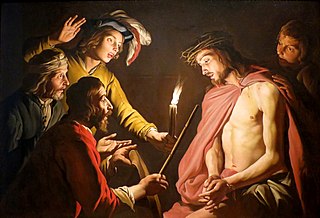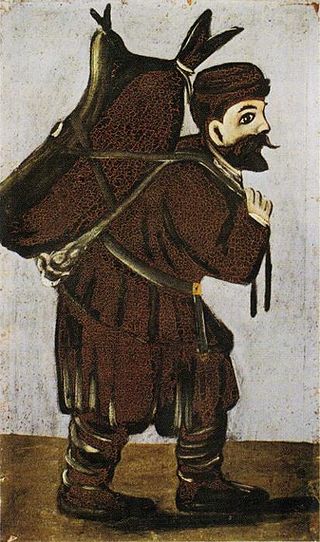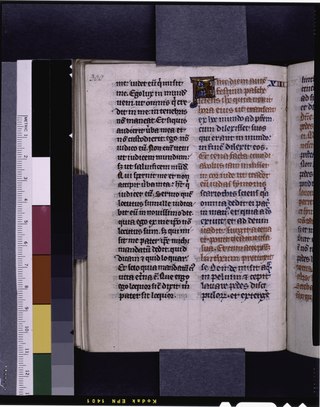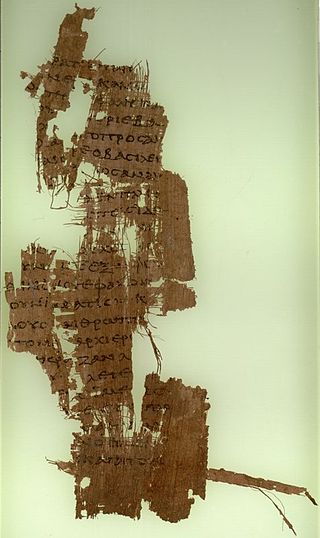The Olivet Discourse or Olivet prophecy is a biblical passage found in the Synoptic Gospels in Matthew 24 and 25, Mark 13, and Luke 21. It is also known as the Little Apocalypse because it includes the use of apocalyptic language, and it includes Jesus' warning to his followers that they will suffer tribulation and persecution before the ultimate triumph of the Kingdom of God. The Olivet discourse is the last of the Five Discourses of Matthew and occurs just before the narrative of Jesus' passion beginning with the anointing of Jesus.

The Passion is the short final period before the death of Jesus, described in the four canonical gospels. It is commemorated in Christianity every year during Holy Week.

The life of Jesus is primarily outlined in the four canonical gospels, which includes his genealogy and nativity, public ministry, passion, prophecy, resurrection and ascension. Other parts of the New Testament – such as the Pauline epistles which were likely written within 20 to 30 years of each other, and which include references to key episodes in the life of Jesus, such as the Last Supper, and the Acts of the Apostles, which includes more references to the Ascension episode than the canonical gospels also expound upon the life of Jesus. In addition to these biblical texts, there are extra-biblical texts that Christians believe make reference to certain events in the life of Jesus, such as Josephus on Jesus and Tacitus on Christ.

Mark 14 is the fourteenth chapter of the Gospel of Mark in the New Testament of the Christian Bible. It contains the plot to kill Jesus, his anointing by a woman, the Last Supper, predictions of his betrayal, and Peter the Apostle's three denials of him. It then begins the Passion of Jesus, with the garden of Gethsemane and Judas Iscariot's betrayal and Jesus' arrest, followed by Jesus' trial before the Sanhedrin and Peter's denials of Jesus.

Matthew 1:22 is the twenty-second verse of the first chapter of the Gospel of Matthew in the New Testament. Joseph has just been spoken to in a dream by an angel.

The baptism of Jesus by John the Baptist is a major event in the life of Jesus which is described in the three synoptic Gospels of the New Testament, in which John baptized Jesus with water and laying on of hands to fulfill all righteousness. Jesus Christ who is God in His essence cannot be purified either realistically or ritually, so His baptism is according to Jesus to "fulfill all righteousness". He said to John the Baptist “Permit it to be so now, for thus it is fitting for us to fulfill all righteousness”. The word "thus" in English is "hutos" in Greek which means "in this way", "in most appropriate way", "in no other way but this". And righteousness which is "dikaiosune" in Greek means the "fairest state that has no defect at all", "fairness and justice". So it was to fulfill God's righteouness that John baptized Him and Jesus was to receive His baptism. It is considered to have taken place at Al-Maghtas, today located in Jordan.

Matthew 5 is the fifth chapter of the Gospel of Matthew in the New Testament. It contains the first portion of the Sermon on the Mount, the other portions of which are contained in chapters 6 and 7. Portions are similar to the Sermon on the Plain in Luke 6, but much of the material is found only in Matthew. It is one of the most discussed and analyzed chapters of the New Testament. Warren Kissinger reports that among early Christians, no chapter was more often cited by early scholars. The same is true in modern scholarship.
Bible prophecy or biblical prophecy comprises the passages of the Bible that are claimed to reflect communications from God to humans through prophets. Jews and Christians usually consider the biblical prophets to have received revelations from God.

New Wine into Old Wineskins is a parable of Jesus. It is found at Matthew 9:14–17, Mark 2:18–22, and Luke 5:33–39.

Matthew 9 is the ninth chapter of the Gospel of Matthew in the New Testament and continues the narrative about Jesus' ministry in Galilee as he ministers to the public, working miracles, and going through all the cities and towns of the area, preaching the gospel, and healing every disease. This chapter opens with Jesus back in "his own town", i.e. Capernaum.

Matthew 14 is the fourteenth chapter in the Gospel of Matthew in the New Testament section of the Christian Bible. It continues the narrative about Jesus' ministry in Galilee and recounts the circumstances leading to the death of John the Baptist.

John 13 is the thirteenth chapter of the Gospel of John in the New Testament of the Christian Bible. The "latter half" or "closing part" of John's Gospel commences with this chapter. The nineteenth-century biblical commentator Alexander Maclaren calls it "the Holy of Holies of the New Testament" and the "most sacred part of the New Testament", as it begins John's record of the events on the last night before the crucifixion of Jesus Christ, emphasising Jesus' love for His disciples, demonstrated in the service of washing their feet, and His commandment that they love one another in the same way. The author of the book containing this chapter is anonymous, but early Christian tradition uniformly affirmed that John composed this Gospel.

John 18 is the eighteenth chapter of the Gospel of John in the New Testament of the Christian Bible. This chapter records the events on the day of the Crucifixion of Jesus, starting with the arrest of Jesus the evening before. The three denials of Peter are interwoven into the narrative concerning the trials of Jesus.

John 19 is the nineteenth chapter of the Gospel of John in the New Testament of the Christian Bible. The book containing this chapter is anonymous, but early Christian tradition uniformly affirmed that John composed this Gospel. This chapter records the events on the day of the crucifixion of Jesus, until his burial.

Luke 17 is the seventeenth chapter of the Gospel of Luke in the New Testament of the Christian Bible. It records "some sayings of Jesus" and the healing of ten lepers. The book containing this chapter is anonymous, but early Christian tradition uniformly affirmed that Luke the Evangelist composed this Gospel as well as the Acts of the Apostles.

There are a number of episodes in the New Testament in which Jesus was rejected. Jesus is rejected in Judaism as a failed Jewish messiah claimant and a false prophet by most Jewish denominations.
The books of the New Testament frequently cite Jewish scripture to support the claim of the Early Christians that Jesus was the promised Jewish Messiah. Scholars have observed that few of these citations are actual predictions in context; the majority of these quotations and references are taken from the prophetic Book of Isaiah, but they range over the entire corpus of Jewish writings.

The triumphal entry into Jerusalem is a narrative in the four canonical Gospels describing the arrival of Jesus in Jerusalem a few days before his crucifixion. This event is celebrated each year by Christians on Palm Sunday.

The mocking of Jesus occurred several times, after his trial and before his crucifixion according to the canonical gospels of the New Testament. It is considered part of Jesus' passion.

John 20:22 is the twenty-second verse of the twentieth chapter of the Gospel of John in the New Testament. It records Jesus giving the Spirit to the disciples during his first appearance after the resurrection. Jesus gives Holy Spirit
















